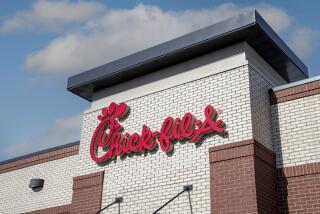America: Think of It as a Brand Name
- Share via
Osama bin Laden is the greatest brand manager in the world. He has a niche product with limited appeal, a relatively small budget and limited distribution. Yet his Al Qaeda brand has 100% unaided awareness and is gaining share in a market segment that we should own: decent Islamic men and women in Kuwait, Egypt, Nigeria and even the U.S.
We’re being out-marketed by a guy whose office is a cave.
I am neither trivializing the threat nor lionizing Bin Laden. But this war, even more than past ones, is about marketing ops as well as military ops.
Many of the key battles will be fought on white boards and flip charts. Controlling the airwaves is as important as controlling the air.
If we don’t win the marketing war, we won’t win the real war either.
Here’s what we need to do.
First, we shouldn’t dismiss upstarts with small budgets and small niche positions. Marketing is the great equalizer, the slingshot that small organizations use to bring down larger Goliaths.
IBM initially dismissed EMC, Purina paid little heed to Iams, Miller ignored Sam Adams, and all the big audio manufacturers sniffed at Bose.
Yet those smaller companies all built huge positions in tough markets. The common formula: passion, a visceral connection to a well-defined consumer segment, patience, a hands-on CEO and grass-roots marketing. Sound familiar?
Second, we need to make sure we’re targeting the right segment.
We’re surprised that the wealthy upper classes in Egypt, Kuwait and Saudi Arabia don’t support the U.S. in this struggle. Why should we be? The Mohamed Atta sorts have zero interest in our fundamental values proposition--increased opportunity and freedom.
So what is our natural target market? The poor, the hungry, those yearning to breathe free.
Our marketing plan is etched in bronze on the base of the Statue of Liberty. Brand America sells to normal families, not bored, rich kids smoking in sidewalk cafes in Cairo. We’re Wal-Mart, not Harrods.
Much of the anger we see among our natural market is created by the perception that people would love to buy Brand America, but it’s out of stock in their political systems.
The shelves are empty. We need to fix that.
One of our greatest assets in the Cold War was the belief by ordinary people living under communist rule that they would be better off under a system more like ours.
We need to create the same situation in this war.
Third, we need to take a hard look at how our segment views Brand America today.
The stars-and-stripes is not just another brand logo, like Nike’s “swoosh” or Coca-Cola’s red circle. Still, every time we’ve done this even for simple consumer brands, we’ve been surprised. We will be here as well.
Fourth, we need to change our communication. Today, we’re committing that most cardinal of advertising sins, talking to ourselves.
War-weary Afghans don’t care about our losses. And humanitarian aid is a fine thing to do, but we’ve been dropping peanut butter with labels written in English to people who don’t eat peanut butter and can’t read English.
It looks great on TV but probably doesn’t do much to get our message across.
We need to rethink which channels are best to get the message through.
Secretary of Defense Donald Rumsfeld has said we’re losing the propaganda war. Propaganda is short-term communication designed to inflate or deflate morale.
The problem is worse: We’re losing the brand war.
More to Read
Inside the business of entertainment
The Wide Shot brings you news, analysis and insights on everything from streaming wars to production — and what it all means for the future.
You may occasionally receive promotional content from the Los Angeles Times.










